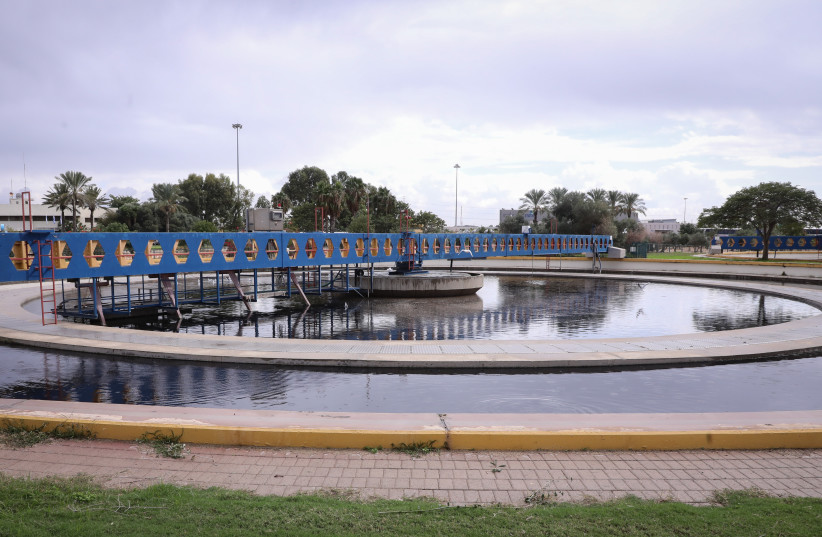They say rain is a sign of good fortune – and as I write this, it has just started to rain in Israel. Good luck, Minister Idit Silman!
By JODIE COHEN FEBRUARY 17, 2023

When it rains in Israel, it really rains. The problem is that there just hasn’t been enough rainfall this winter. And even with the recent downpours, experts are suggesting that we could be witnessing one of the driest winters in decades.
Despite this, Israel – the frequently drought-affected tiny country in the desert with scarce water resources – actually produces 20% more water than it needs. Israel has achieved this thanks to innovations such as drip irrigation and desalination, as well as government prioritization over decades. Those decades, of course, include governments led by Israel’s current prime minister, Benjamin Netanyahu.
So could the return of Netanyahu to office spell good news on the environmental front? Within one week of the new government being sworn in, it called for the cancellation of the tax on single-use plastics. As the largest users of disposable tableware, the move had been seen by the ultra-Orthodox as unfairly targeting them. This comes despite the fact that the community is thought to have a lower carbon footprint than the wider population, generally favoring public transportation, taking fewer flights, and reusing items more.
For those concerned about the environment, canceling the plastics tax isn’t seen as a step in the right direction. However, most of the coalition agreements do include a distinct section on the environment, and the guiding principles of the coalition also provide an indication of the government’s green plans. So it’s worth looking into the details to find out more about what we can expect from Israel’s 37th government when it comes to protecting the planet.
The policies
The guiding principles include pledges to take action to safeguard the environment, to improve the quality of life for the country’s residents, and to ensure that the country contributes toward global efforts on climate and environmental issues. The plan also includes a vow to encourage people to use public transportation and to ease traffic congestion on Israel’s roads. Sounds promising?
Israeli Environmental Protection Minister Idit Silman is seen at the handover ceremony replacing outgoing minister Tamar Zandberg, in Jerusalem, on January 2, 2023. (credit: YONATAN SINDEL/FLASH90)
The new government has also pledged to introduce a law on greenhouse gas emissions that would upgrade Israel’s target. The new goal would reduce emissions by 50% by the end of the decade compared to a 2015 baseline, and the government reportedly intends to pass the “climate law” within its first six months.
THE REVISED emissions target will be challenging to achieve. In order to reach it, the government has suggested that renewable energy sources like wind and solar energy must be increased. It’s interesting to note that on his first trip abroad since again becoming prime minister, Netanyahu and Jordan’s King Abdullah agreed to speed up the water-energy deal between their two countries. In the deal, Israel will help provide desalinated water to Jordan, while Jordan will provide solar energy for Israel’s use.
However, solar and wind energy aren’t consistent (the sun isn’t always out, even though it may not feel that way in August). So the government has highlighted that energy storage solutions urgently need to be found in order to reach the emissions target.
To this end, in mid-January the Energy Ministry announced the setting up of a national research institute alongside the Technion and Bar-Ilan University. The institute will look into the challenges of energy storage and share its research with others. This will no doubt be of interest to many in the Start-up Nation who are continually looking to find solutions to some of the toughest energy and environmental challenges.
In addition, the coalition agreements suggest there will be a target date and funds set aside to remove industry from Haifa Bay and that action will be taken to protect nature and preserve open spaces and the marine environment, such as reducing fishing. And, in spite of Israel’s incredible success in water conservation, desalination and recycling – almost 90% of wastewater is currently recycled, making Israel the world leader in this field – a further goal has been set. By 2025, some 95% of wastewater will be recycled for agricultural use. This means there will be more fresh water available for people to drink, as less will be required for farming purposes.
The people
Let’s also look at some of the people taking the lead on environmental protection in the new government. Likud MK Gila Gamliel is thought to have pushed for the environmental clauses in the coalition agreements and had reportedly been keen to return to her former position as environmental protection minister. However, Netanyahu ultimately put Idit Silman in that post (who is probably best known for helping to bring down the last government).
Within the first few weeks of the new coalition being in power, Silman’s ministry approved the appointment of Guy Smet as director-general. He has served in the department for 21 years, including as acting CEO. He has also worked in the Energy Ministry as head of the Natural Resources Directorate and director of the Sustainable Energy division, so he brings with him a wealth of experience.
Upon his appointment, Silman said, “I am happy that Guy is returning home to the Ministry of Environmental Protection. Guy knows the ministry and the challenges we have faced. I see protecting the environment as an expression of love for the homeland, and together we will lead practical actions and address the lack of environmental governance.”
At the Environment 2050 Conference in Tel Aviv in mid-January, Silman set out some of her priorities in the conference’s opening speech, including on the topic of tackling waste, which she suggested should be seen as a resource and not a nuisance. She spoke about the consequences of illegal waste and environmental crimes, such as illegal landfills and quarries, pirated scrapping of vehicles, the burning of agricultural waste, and dumping of construction waste. “This is what we will fight,” she said, pledging to promote a construction waste law.
She also talked about the importance of environmental education. “We will continue to strengthen and maintain cooperation with environmental organizations, in this way promoting the heritage of Israel and the love of the land. We will soon hold a meeting with the representatives and management of the youth movements who are partners in the campaign, and we will expand this cooperation.”
And she appears to be taking a hands-on approach to learning about her new role, opting to go scuba diving in Eilat to help with coral reef preservation efforts, and raise awareness about their importance.
HOWEVER, IT’S important to remember that the coalition agreements also promise a number of other measures, including ones that might seem counter to protecting nature, such as extensive construction across the country. This includes building new communities in the peripheries, where people tend to use more private cars to get around.
The pledge to improve public transportation could mean lowering the use of gas-guzzling cars, and more needs to be done to improve and encourage greater use of public transportation, making it quicker, more efficient and cost-effective. The announcement of a bullet train to Eilat could also mean fewer flights from and to the South and would open up welcome job opportunities for the residents there.
At the same time, building the infrastructure for the bullet train could jeopardize conservation efforts. And commentators have expressed concern that the proposed judicial reform plan could make it harder for people to appeal development decisions if they feel the environment or health is being placed at risk.
Silman has a tough job ahead of her, vying with competing interests such as corporates and lobby groups, proponents of traditional energy, and pressure to transport oil to the world through Eilat. She must work closely with other ministries, yet compete with them over sometimes conflicting interests and tight budgets. And with key roles changing hands – like the position of energy minister rotating when Israel Katz is due to take over as foreign minister, and the Finance Ministry which was due to move from Bezalel Smotrich to Arye Deri, who’s now been disqualified as a minister – ensuring continuity will also be a challenge.
It is also important to remember that the new coalition’s published plans and its guiding principles are not legally binding, and it remains to be seen which clauses will be implemented. In the meantime, the plans have received a somewhat cautious welcome from environmental groups. I suggest in terms of the environment, the government is judged not on its pledges but on its actions.
Meanwhile, they say rain is a sign of good fortune – and as I write this, it has just started to rain. Good luck, Minister Silman!
The writer is Middle East Correspondent for India’s WION (World Is One) TV news channel. The author of Tikkun Olam: Israel vs COVID-19, she has helped numerous multinationals report on their contributions to tackling the UN’s Sustainable Development Goals. On Twitter: @JodieCohen613.

